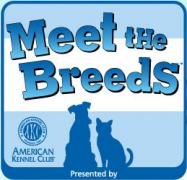Meeting the Breeds and Choosing a Healthy Dog for Your Family

Meeting the Breeds and Choosing a Healthy Dog for Your Family
No other animal on earth may be found in greater variety than the domestic dog. Lovers of purebred dogs are enamored of these creatures for a variety of breed-specific features. Some are partial to large dogs like the Bull Mastiff, others to small ones like the minute Xolo. Some dog lovers are drawn to long-coated dogs like the Bearded Collie; others, to dogs with an untamed haircoat like the Chinese Crested. For some people, the attraction to a particular breed of dog is not its physical characteristics, but its skills. For example, the trustworthy Labrador is a wonderful guide dog.
Whatever breed you fancy, you can find it at the 2011 “Meet the Breeds” show at New York City’s Javits Center on November 19-20, 2011. Billed as an event where families can meet 160 dog breeds and over 50 cat breeds, the event promises to have something for everyone.
Consider This
From my veterinary viewpoint, health is a critical issue when choosing a family dog. Before selecting a new puppy for your family, do your homework. Everyone in the family, a dog included, will have health issues during their lifetime. By knowing your breed’s issues up front, you will be better equipped to detect and monitor problems early. To get started, check the website of the national breed club for your breed. Most national breed clubs devote a section of their website to the health issues AND the ongoing research into those issues for their particular breed.
New Research Helps
Owners of new puppies often ask their veterinarian, “What can I do to keep my new dog healthy for a long time?” Recently published research gives dog owners some insight into this issue. Researchers reviewed the medical records of over 70,000 dogs and classified the cause of death by breed. This information helps owners of purebred dogs to monitor for disease related clinical signs and intervene before a crisis occurs. In this study, Dachshunds were most likely to die from neurological disorders. This is likely related to Dachshunds’ “bad back” and the problems associated with protruding disks common to this breed. Weight control and proper exercise can help to avoid this problem. Like humans, older dogs are more likely to die of cancer and five breeds were associated with an increased risk of cancer: Bernese Mountain Dog, Golden Retriever, Bouvier des Flanders, Scottish Terrier and Boxer. Owners of these dogs must monitor every lump and bump on their dog and have each one evaluated. Large breed dogs more commonly die of musculoskeletal diseases. Owners of large breed dogs need to keep their dogs in ideal body condition since overweight and obese dogs develop more musculoskeletal disorders.
Involve the Family
Every family member needs to be involved in monitoring and caring for the family dog. Adults are ultimately responsible for managing the canine family member’s healthcare issues, but getting buy-in from all members will simplify the process. Even the youngest child can promote a healthy lifestyle for the family dog by not feeding the pet from the table. The extra treats will result in obesity and a shorter lifespan and the behavior is just plain bad manners! Every dog needs obedience training and this is a perfect opportunity to involve older children. Obedience trained dogs are less likely to be involved in bite incidents and are also less likely to suffer from separation anxiety – a major cause of relinquishment of dogs to rescue groups and animal shelters.
See You There
Don’t miss this great opportunity to meet wonderful purebred dogs, ask questions about them and learn which one is the best one for your family. Stop by The Animal Medical Center booth to say hi! You can meet some of the staff and veterinarians who work with us and ask questions about your dog’s health.
________________________________________________________
This may also be found in the “Tales from the Pet Clinic” blog on WebMD.com.
For over a century, The Animal Medical Center has been a national leader in animal health care, known for its expertise, innovation and success in providing routine, specialty and emergency medical care for companion animals. Thanks in part to the enduring generosity of donors, The AMC is also known for its outstanding teaching, research and compassionate community funds. Please help us to continue these efforts. Send your contribution to: The Animal Medical Center, 510 East 62nd Street, New York, NY 10065. For more information, visit www.amcny.org. To make an appointment, please call 212.838.7053.


































